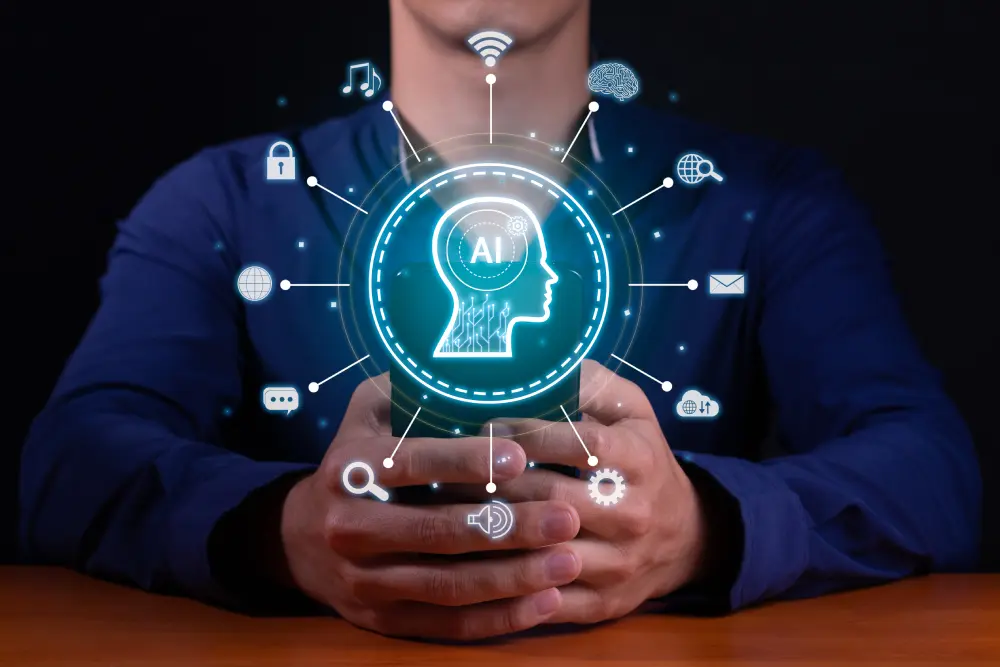The rapid development of Artificial Intelligence (AI) is transforming various industries, and outsourcing is no exception. Businesses today are increasingly leveraging AI to optimize operations, reduce costs, and enhance service delivery. This shift is driving a new era where AI-powered outsourcing is becoming a strategic advantage rather than just a cost-saving measure.
In this article, we explore the opportunities and challenges that arise when combining AI with outsourcing services. While AI offers significant benefits in terms of efficiency, scalability, and data-driven decision-making, it also introduces challenges related to data security, implementation complexity, and the balance between automation and human expertise.

Table of Contents
ToggleThe Rise of AI in Outsourcing Services
AI is reshaping the outsourcing industry by automating workflows, streamlining recruitment processes, and improving decision-making. Businesses that integrate AI into their outsourcing strategies can benefit from faster hiring, smarter talent matching, and enhanced operational efficiency.
Key AI applications in outsourcing services:
- AI-powered recruitment: AI-driven tools can screen resumes, assess candidates, and match them with job requirements more effectively.
- Chatbots & virtual assistants: AI automates customer support by handling inquiries, resolving issues, and improving response times.
- AI vetting talent: AI algorithms analyze skill sets, experience, and project compatibility to match candidates with the right roles.
- AI-driven data analytics: Businesses use AI to analyze large datasets, identify trends, and make informed decisions.
Common AI services Used in Outsourcing
AI is applied in various outsourcing functions to enhance efficiency and innovation.
- Machine Learning (ML) allows AI systems to learn from data patterns, continuously improving processes and optimizing decision-making.
- Natural Language Processing (NLP) powers chatbots, voice assistants, and automated translations, facilitating seamless communication in global outsourcing operations.
- Robotic Process Automation (RPA) automates repetitive tasks such as data entry, invoice processing, and HR management, reducing human error and improving efficiency.
- Data Analysis powered by AI helps businesses interpret customer behavior, predict trends, and make data-driven decisions to enhance operational strategies.
- Deep Learning enables AI systems to recognize patterns, images, and speech, contributing to automation and user experience improvements.
- Generative AI supports marketing, customer engagement, and content creation, allowing businesses to scale creative processes while maintaining consistency.
Opportunities of Combining AI and Outsourcing
1. Cost Efficiency and Scalability
AI reduces labor costs by automating repetitive processes, enabling businesses to achieve the same or even better results with fewer resources. In outsourcing, AI plays a crucial role in streamlining recruitment by automatically screening and shortlisting candidates, saving both time and hiring costs. Additionally, AI enhances workforce management by ensuring optimized staff allocation based on real-time demand. By minimizing human intervention in routine tasks, AI helps businesses increase efficiency and achieve long-term cost savings.
2. Enhanced Productivity and Performance
AI eliminates repetitive tasks, allowing employees to focus on more strategic and high-value work. In customer support, AI-powered chatbots and virtual assistants can handle basic inquiries, FAQs, and service requests without human intervention. AI also helps automate data processing, simplifying tasks such as data entry, verification, and financial transactions. Moreover, AI-driven workflow automation improves business operations by streamlining document processing, HR onboarding, and payroll management, enabling smoother and more efficient workflows.
3. Improved Talent Matching and Recruitment
AI enhances recruitment accuracy and speed by analyzing candidate profiles, matching skills with job requirements, and recommending the best-fit talent. With AI-driven resume screening, companies can accelerate the hiring process and reduce time-to-hire. Additionally, AI improves candidate-job alignment, ensuring a better fit between applicants and job roles through objective skill assessments. By leveraging data-driven insights, AI also reduces hiring biases, helping businesses make fairer and more effective hiring decisions.
4. Leveraging Advanced Data Analytics
AI-powered outsourcing services enable businesses to harness real-time data insights for better decision-making. AI can identify market trends, allowing companies to adjust strategies based on evolving industry demands. Additionally, AI’s predictive capabilities help businesses forecast project outcomes, enhancing risk management and planning. By utilizing AI-driven business intelligence, organizations can improve operational efficiency and make informed strategic decisions.
5. Improved Talent Utilization
AI allows outsourced teams to focus on complex, creative, and strategic tasks, while administrative work is handled through automation. This shift enhances employee satisfaction, as professionals engage in more meaningful and fulfilling work. It also fosters greater innovation, enabling teams to dedicate more time to creative problem-solving and breakthrough ideas. By combining human expertise with AI-driven efficiency, businesses can maximize productivity, optimize resource allocation, and execute projects more effectively.

Challenges of Combining AI and Outsourcing
1. Data Security and Privacy Risks
AI-powered outsourcing involves processing and storing sensitive business and customer data, which raises significant concerns about security and privacy. The use of cloud-based AI solutions increases the risk of data breaches and cyber threats, making it essential for businesses to implement strong security measures. Additionally, companies must ensure compliance with global data protection regulations, such as GDPR, CCPA, and ISO security standards, to avoid legal complications. Ethical concerns also arise regarding data ownership and control, especially when outsourcing AI-driven processes to third-party providers, requiring clear agreements on data usage and governance.
2. AI Limitations and Ethical Concerns
While AI enhances efficiency, it lacks the intuition, emotional intelligence, and creativity that humans bring to the workplace. This limitation can affect customer interactions, as AI-driven responses may feel robotic and impersonal, reducing engagement quality. AI algorithms are also prone to inherent biases, as they learn from historical data, potentially leading to unfair or inaccurate decision-making. Moreover, in complex problem-solving scenarios where human judgment and critical thinking are crucial, AI may struggle to provide the most effective solutions, making human oversight essential in AI-driven outsourcing operations.
3. Integration Challenges and Implementation Costs
Many businesses face difficulties in integrating AI into their outsourcing processes due to technical and financial barriers. Existing legacy systems may not be fully compatible with modern AI tools, requiring costly upgrades or complete system overhauls. Additionally, the high costs of AI implementation, training, and ongoing maintenance can be a significant financial burden, particularly for small and mid-sized enterprises. Beyond financial concerns, training AI models to align with specific business needs and workflows requires technical expertise, adding to the complexity of successful AI adoption in outsourcing.
4. Dependence on AI and Loss of Human Touch
Over-reliance on AI in outsourcing can lead to operational risks and a decline in customer experience. If AI systems experience downtime, errors, or cyberattacks, businesses may face serious disruptions that impact service delivery and client relationships. Excessive automation can also result in a lack of personalized customer interactions, reducing trust and engagement. To address this, businesses must implement a balanced AI-human approach, ensuring AI enhances efficiency while maintaining the human touch needed for strong client relationships and personalized service.
How Businesses Can Leverage AI-Driven Outsourcing Effectively
To maximize the benefits of AI in outsourcing while mitigating risks, businesses should:
- Define clear objectives: Identify key processes where AI can provide the most value.
- Adopt a hybrid workforce model: Combine AI automation with human expertise to ensure balance.
- Invest in training and upskilling: Prepare employees to work alongside AI tools.
- Ensure data security compliance: Implement robust cybersecurity measures and follow data protection regulations.
- Partner with AI-integrated outsourcing providers: Choose outsourcing firms that offer AI capabilities while maintaining human oversight.
Conclusion
The integration of AI into outsourcing presents exciting opportunities for businesses looking to optimize efficiency, reduce costs, and leverage data-driven insights. However, it also brings challenges that require careful implementation, security considerations, and a balanced AI-human approach.
As AI technology continues to evolve, companies that strategically embrace AI-powered outsourcing while preserving human expertise will gain a significant competitive advantage. If you’re looking to leverage AI-driven outsourcing solutions, now is the time to take action—explore, adapt, and innovate.



